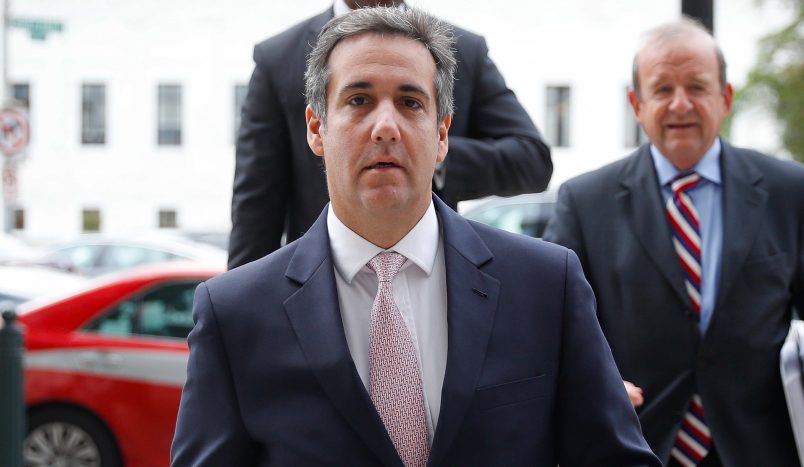The FBI’s raid on Michael Cohen, to put it bluntly, is a big frickin’ deal, former federal prosecutors and other criminal justice experts say.
To raid any law office would require investigators to jump through a whole special series of hoops and added review. That one of the lawyer’s longtime clients is the sitting President of the United States adds another layer of extreme sensitivity and caution.
“The spotlight on this is so bright and the measure is so extraordinary that they would have to be a little crazy to do this without pretty ironclad evidence of some kind of wrongdoing,” said Julian Sanchez, a senior fellow at the Cato Institute who studies technology, privacy, and civil liberties.
“You pull a move like this and it was all a big misunderstanding, that’s hugely embarrassing,” he said.
Deputy Attorney General Rod Rosenstein made the decision to hand over to the U.S. Attorney’s Office in the Southern District of New York certain information pertaining to Cohen brought to him by Special Counsel Robert Mueller, Bloomberg reported. The raid on Cohen’s office in midtown Manhattan, his home office and a hotel room he was using would have likely needed the sign off of interim U.S. Attorney Geoffrey S. Berman, a White House-backed appointee of Attorney General Jeff Sessions, as well as top officials at Justice Department’s headquarters in Washington, former prosecutors told TPM.
Deputy Attorney General Rod Rosenstein, they suggested, would likely have been looped in on the move. The Justice Department declined to comment.
The New York Times, in breaking the news of the raids, said investigators seized business records, emails and documents related to several topics, including Stormy Daniels, an adult film star whose alleged affair with Donald Trump in 2006 Cohen sought to keep quiet ahead of the 2016 election through a $130,000 hush payment.
The Washington Post, citing a person a person with knowledge of the case, reported that Cohen is being investigated for possible bank fraud, wire fraud and campaign finance violations.
The Justice Department has extensive rules about seizing records of lawyers that could typically fall under attorney-client privilege. Prosecutors are required to consult with the the Criminal Division at Main Justice, and to get the sign off of the U.S. attorney overseeing the investigation or the relevant assistant attorney general. It’s also recommended that a special team of attorneys who are walled off from the prosecutors overseeing the inquiry be set up to review the potentially privileged documents.
“It’s procedurally cumbersome, it’s sensitive, it raises the hackles of the bar,” Sam Buell, a former prosecutor who worked on the Enron investigation, told TPM. “It’s not done on a fishing expedition. It’s only done when you’re reasonably confident that you’re going to find evidence of criminality and you need to do it with a search warrant.”
Investigators’ willingness to go the route of a high-profile raid, instead of a less intrusive subpoena or even a voluntary request for documents, suggested to outside experts that there’s at least some concern that Cohen could be withholding evidence.
“It tells you that, one, they had some pretty compelling reason to think that Cohen was not or would not produce the records they were trying to get in response to a subpoena” Sanchez said, adding that he’d, “infer that they have some evidence he has already withheld something that he claimed to have turned over.”
Secondly, Sanchez said, the move suggests that the prosecutors would have reason to believe that the records that they are seeking would be exempt from attorney-client privilege. The most obvious exception, Sanchez said, is the crime-fraud exemption which applies to communications made in the furtherance of a crime.
“If you’re talking to your attorney about a crime you’ve already committed, that’s privileged,” Sanchez said. “If you’re talking to your attorney to get them to help you to commit crime, that’s the part that’s not privileged.”
Former prosecutors also said that move to hand off the inquiry to federal prosecutors in New York once Mueller flagged the information shows that the special counsel is playing it by the book, even as President Trump and his allies suggest that he’s on a witch hunt.
“That’s pretty standard,” said Patrick Cotter, a former federal prosecutor who investigated organized crime for the U.S. Attorney’s Office of the Eastern District of New York. “It would be news if [Mueller] didn’t [refer it out].”







Is that Starsky’s car in the background?
I always trusted that the U.S. Constitution and the integrity and resilience of our institutions would save the country, but it seems Robert Mueller might single-handedly do that. While I am grateful for that, it is also scary.
If memory serves, the only other Trumpist whom the Feds have raided and seized documents from is Manafort, who has been indicted on enough crimes to put him away for the rest of his life and then some. It’s a good guess that they’ve got equally serious evidence about Cohen. No wonder the Dotard is becoming so unhinged.
Has Cohen been supboena’d before this? Because if he had been - and had obscured / hidden certain facts that the SC knew from other sources, then the full weight of the FBI might come crashing through his front door.
Oh wait…
Could T rump have stashed a bunch of his own criminal records in the possession of Cohen with the expectation that attorney/client privilege would keep them secret for the duration?